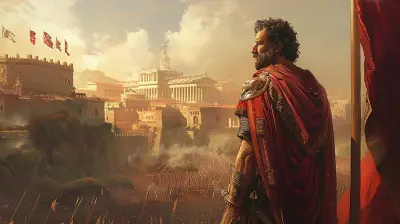22 March 2025
Video games. They’ve become more than just pixels on a screen—they’re a culture, a community, and for some, even a lifestyle. But let’s face it, the world of video gaming hasn’t just been about gameplay. It’s also a high-stakes battlefield for companies trying to outdo each other. Among these battles, one seismic shift rocked the industry to its core: the launch of the Epic Games Store in 2018. And no, it wasn’t just another digital storefront—it was a meteorite that crashed into the status quo, shaking up the very business of how video games are sold, shared, and played.
So, how exactly did the Epic Games Store pull off such a feat? Let’s dig in, unravel this story, and see why this isn’t just another tech tale but a saga of disruption, innovation, and nerve. Strap in, folks—this one’s a game-changer.
The Underdog Enters the Arena
Picture this: it’s 2018, and if you want PC games, there’s one giant door you need to walk through—Steam, Valve’s digital storefront. Steam wasn’t just a leader; it was the king of the hill, holding an iron grip with a developer-friendly platform and an enormous library. It seemed like no one dared to challenge it.And then came Epic Games Store, barging in like an audacious new player at the poker table. Sure, Epic had already made waves with Fortnite, their runaway hit, but could they realistically take on Steam?
At first, people were skeptical. Let’s be honest: we gamers don’t love change. Another launcher? Another account? Nah, we were good with Steam. But Epic wasn’t playing checkers; they were playing chess. They knew they couldn’t topple the king with good intentions or flashy banners. They needed strategy—and boy, did they have one.
The Revenue Split That Made Developers Swoon
If the gaming industry were a kingdom, developers and publishers would be the knights. They’re the ones whose creativity and hard work create the magic. But there’s always been a hidden frustration: the big stores take massive cuts.Steam’s revenue split? A steep 30/70, where developers only get 70% of what their game earns. Epic Games Store came in and said, “Let’s flip the script.” They offered an 88/12 revenue split—that’s a whopping 18% more going directly into developers’ pockets.
Now, think about this. If you’re a developer, wouldn’t you rather keep more of the pie you baked yourself? Epic’s move wasn’t just generous—it was revolutionary. It forced every developer to rethink their loyalties. After all, money talks, and this spoke volumes.
Free Games: The Ultimate Trojan Horse
Here’s where things get interesting. Epic didn’t just lure developers with lower fees; they went straight for the players. The trick? Free games.And not just any free games—big, juicy titles that gamers couldn’t resist. From Subnautica to Grand Theft Auto V, Epic handed out quality games like a candy shop giving free samples. Players flocked to the store, accounts were created by the millions, and Boom! Epic had their foot in the door.
Let’s be real: free stuff is the universal language of love. Gamers who might’ve dismissed the Epic Games Store at first suddenly found themselves logging in every week, grabbing freebies, and—surprise!—checking out the rest of the store. It was a brilliantly subtle way to build loyalty.
Exclusives: The Love-Hate Relationship
If free games were candy, exclusives were the fireworks. Epic didn’t just dabble in exclusives; they went all-in. Games like Borderlands 3, Control, and Metro Exodus became Epic-only for PC users, and the internet practically exploded. People argued, shouted, and (let’s admit it) meme’d.But here’s the genius of it: controversy equals attention. Hate it or love it, everyone was talking about Epic Games Store. And while hardcore fans fumed, casual gamers shrugged and downloaded the launcher. After all, if you really wanted to play an exclusive like Metro Exodus, what choice did you have?
It was a bold, polarizing strategy. Did it make some enemies? Sure. But if there’s one thing Epic understood, it’s that you can’t change the game without ruffling some feathers.
Unreal Engine: The Secret Weapon
Here’s a thing that not everyone talks about, but it’s key to Epic’s success: Unreal Engine. Epic didn’t just build a storefront; they supported it with their own game development tech, which thousands of developers already used.By offering Unreal Engine users extra perks—like waiving their engine royalties if they sold their games on the Epic Games Store—Epic created a seamless ecosystem. It was like giving developers a Swiss Army knife: everything they needed in one place.
This wasn’t just a smart business move. It was a power play. Epic wasn’t just capturing games—they were capturing the very tools used to create them.
Challenging Steam: David and Goliath
Steam wasn’t just lounging on its throne while Epic gained ground. Oh no, the competition heated up. Steam introduced discounts, improved features, and worked hard to remind everyone why they were #1.But here’s the kicker: Epic didn’t need to “win.” Their goal wasn’t to dethrone Steam but to carve out their own space in the market. And, in a way, they succeeded. Steam is still massive, no doubt, but Epic forced the industry to evolve. Players had choices. Developers had new opportunities. And that’s what disruption is all about, isn’t it?
Shaking Up the Industry’s Business Model
It wasn’t just about free games or exclusives. Epic Games Store questioned the very foundations of the gaming business. They showed that storefronts could be more than just middlemen—they could genuinely champion developers and create player-first ecosystems.Other companies noticed. Platforms like Microsoft’s Xbox Game Pass and even smaller stores began taking cues from Epic’s playbook. It was like throwing a stone into a pond—you don’t just see one ripple; you see them spread.
Criticism and Growing Pains
Okay, so not everything was sunshine and rainbows. Epic Games Store did stumble. Critics called out its barebones features (where was the shopping cart, seriously?). Others pointed fingers at their aggressive exclusivity deals, arguing they hurt players more than they helped.But here’s the thing about change: it’s messy. Think of it like renovating a house—you’ll break a few walls and cause a bit of chaos, but in the end, you’re building something better. Epic wasn’t afraid to take the heat, and over time, they’ve patched up most of their problems.
The Bigger Picture: Defining the Future
Here’s a thought to chew on: Epic Games Store isn’t just about selling games. It’s about reshaping the landscape. They’ve redefined what a digital storefront can be, and in doing so, they’ve set the stage for future innovation.As gamers, we’re the real winners here. Competition breeds excellence. Whether you love or loathe the Epic Games Store, there’s no denying that it’s made the industry more dynamic, livelier, and yes, even more player-focused.
Conclusion: A New Level Unlocked
So, how did Epic Games Store change the business of video games? By daring to be different. They rewrote the rules, challenged the heavyweights, and made waves that are still rippling through the industry today. Whether it was through their generous revenue split, free games, exclusives, or Unreal Engine perks, Epic didn’t just enter the game—they redefined the playing field.And let’s face it: this is just the beginning. The gaming industry is evolving faster than ever, and Epic Games Store gave it the jolt it needed. Love them or hate them, they’ve made an impact no one can ignore. And isn’t that what being “epic” is all about?





Colton Franklin
Epic Games Store has significantly reshaped the gaming industry by challenging traditional distribution models, offering better revenue shares for developers and fostering a competitive marketplace that benefits both creators and consumers.
April 4, 2025 at 2:57 AM